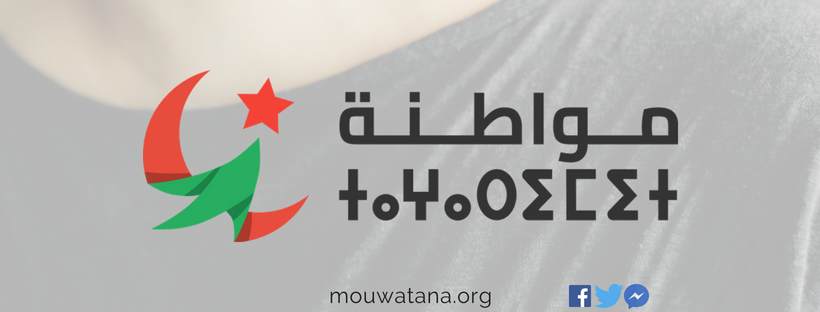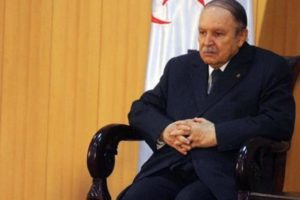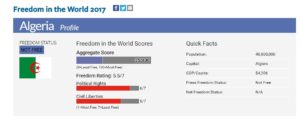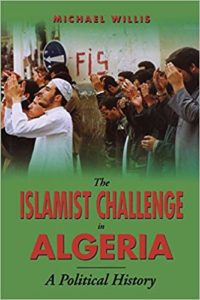
Mouwatana Facebook page
Algerian police recently arrested a number of political and human rights activists and journalists who protested in central Algiers against President Abdelaziz Bouteflika’s bid for re-election for a fifth term, according to press reports. The head of the Union for Change and Progress party, Zubaida Asul, told the Anadolu Agency that the police had arrested her and a number of heads of political parties and other activists who protested in a bid to defend democracy.

WikiCommons
The Algerian League for the Defense of Human Rights (LADDH) denounced the intervention of the security forces, and warned against the use of the security forces to “undermine freedoms,” analyst Hakim Briki writes for the North Africa Journal. Mouwatana, or “Citizens’ Democracy,” a movement created in June 2018 to dissuade President Bouteflika (right) from running for reelection, has denounced the “early presidential campaign” launched by majority parties.
The movement – one of a number of emerging non-violent civil society movements in the region – is expected to gain momentum in the next few months, he adds.
 Few are optimistic about the state of democracy in Algeria, and next spring’s presidential election will provide little encouragement, according to Daniel J. Samet, a research associate with the National Endowment for Democracy’s International Forum for Democratic Studies.
Few are optimistic about the state of democracy in Algeria, and next spring’s presidential election will provide little encouragement, according to Daniel J. Samet, a research associate with the National Endowment for Democracy’s International Forum for Democratic Studies.
Although he has not yet announced his candidacy, Bouteflika is poised to run for a fifth term. Bouteflika, 81 and in poor health, maintains the backing of the country’s ruling establishment and in 2012 became the longest-serving chief executive in Algeria’s history. As long as Bouteflika stays in power, democratic openings are unlikely, Samet writes for the Freedom House blog.
 Algeria is defined as “unfree” by Freedom House, the democracy and human rights watchdog.
Algeria is defined as “unfree” by Freedom House, the democracy and human rights watchdog.
Fifteen years after the country’’s “black decade” of jihadist insurgency, “radicalism appears to hold relatively little appeal in Algeria,” one analyst noted, adding that “in terms of [Islamic State’s] recent recruitment of foreign fighters, Algeria lags far behind other countries in North Africa.”
The country’s 2017 elections witnessed a small number of foreign observers from the United Nations, European Union, African Union, and the Arab League, one analyst observed for the Carnegie Endowment, noting that in 2012 and 2014 the Algerian government allowed democracy assistance NGOs like the Carter Center and the National Democratic Institute (NDI) to observe the elections.
 “An indicator that the ruling elite is implementing an agreed succession plan would be ‘grooming’ through media coverage and public appearances of a potential candidate, even if he appears to be from the opposition, but who is subsequently endorsed by the ruling FLN party and the RDN, and ‘blessed’ by Bouteflika,” notes IHS country analyst Jihane Boudiaf.
“An indicator that the ruling elite is implementing an agreed succession plan would be ‘grooming’ through media coverage and public appearances of a potential candidate, even if he appears to be from the opposition, but who is subsequently endorsed by the ruling FLN party and the RDN, and ‘blessed’ by Bouteflika,” notes IHS country analyst Jihane Boudiaf.
“Although this would be an indicator mitigating government instability risks, the dismissal or arrest, probably on corruption charges, of senior officials or prominent businessmen inside Bouteflika’s close circle, would be a likely indicator of failure to agree on the succession, increasing the risk of government instability,” Boudiaf adds.
Addressing concerns about religious extremism will be critical in post-Bouteflika Algeria. The country should find inspiration in Tunisia and Israel, where democracy remains strong despite the threat of religious extremism, the NED’s Samet adds:
The former could serve as a model. Tunisia has effectively cracked down on jihadists while pushing democratic reforms — there have been virtually no terrorist incidents since the brutal attacks on tourists in 2015. Ensuring that the post-Bouteflika Algeria tackles its radicalization problem while adopting necessary democratic reforms will not be easy. The imminent challenge for the country is to safeguard outlets of political dissent without allowing them to be hijacked by extremists.
“For the time being, any pro-democratic engagement in Algeria must be undertaken with a full understanding of the quagmire presented by Islamic radicalism,” he concludes.
 Low turnout in last year’s parliamentary elections signal Algerians’ unwillingness to participate in large enough numbers to make significant changes, a recent STRATFOR analysis suggests.
Low turnout in last year’s parliamentary elections signal Algerians’ unwillingness to participate in large enough numbers to make significant changes, a recent STRATFOR analysis suggests.
“But with each passing year under leadership viewed as stagnant and inept, the cracks that form will provide opportunities for building energetic dissent,” it states. “If the opposition can channel that dissent in the right way, demanding accountability and flexibility within the political system rather than making an unrealistic attempt to implode it, Algerians may become confident enough in the possibility of small changes that they get more politically involved.”







